Feeling the loss of Supergirl yet this summer? Don’t know what to watch (other than Wynonna Earp, of course)? Need a little pick me up? If any or all of these are true, it’s time you picked up Supergirl: Being Super. With this issue, the four part out-of-main-continuity miniseries has reached its conclusion. If I haven’t been able to convince you yet that you should read this, it’s my last chance. You really, really should be reading this.
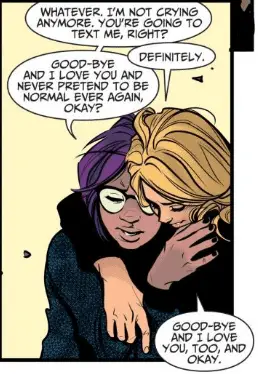
In this final issue, Kara learns that Tan-On, a fellow Kryptonian who had been experimented on by Coach Stone for renewable energy research, was a scientist sent to earth as an ambassador. While on the run, she gets a message from Dolly saying she’s been kidnapped by Coach Stone. When the two Kryptonians go to save Dolly, Kara is taken captive, to replace Tan-On in Stone’s experiments. Tan-On goes full on revenge mode, killing all the scientists, save Stone, and destroying the lab. Kara breaks free and rescues Dolly from Tan-On’s clutches. Tan-On disappears, a disappointment to Lex Luthor, the man behind the experiments. Kara tells Dolly everything about her powers and her past; Dolly tells Kara about a ‘Superman’ people are talking about in Metropolis. The issue ends with Dolly getting a girlfriend and Kara going on the lam and finally meeting Superman.
Why Pick This Up
Even if you don’t read the main Supergirl series (I don’t), Supergirl: Being Super is well worth reading. Tamaki and Jones bring young Kara Danvers to life. With this miniseries, they successfully transform her from a sunny teenage girl who likes to run fast and can sometimes fly into Supergirl, the hero willing to face untold odds to save others.
Mariko Tamaki and Joëlle Jones have been a seamless whole this whole run. I honestly can’t imagine a Supergirl comic without Tamaki’s writing and Jones’s art; they’re a packaged deal in my mind, and I’d read just about anything they did together. Tamaki writes Kara’s soul in heartbreaking detail, balancing Kara’s compassion and loss perfectly. All the while Kara still feels like a teenage girl trying to find herself and her place in the world while she learns she’s not truly of this world.
Jones’ art brings the depths of Tamaki’s writing to live in vivid color. Kara Danvers truly flies under Jones’ pen, her sense of movement capturing the athleticism involved in being a superhero. But there’s beauty to it as well, fluidity. Kara doesn’t just fly, she dances through the air with power and grace.
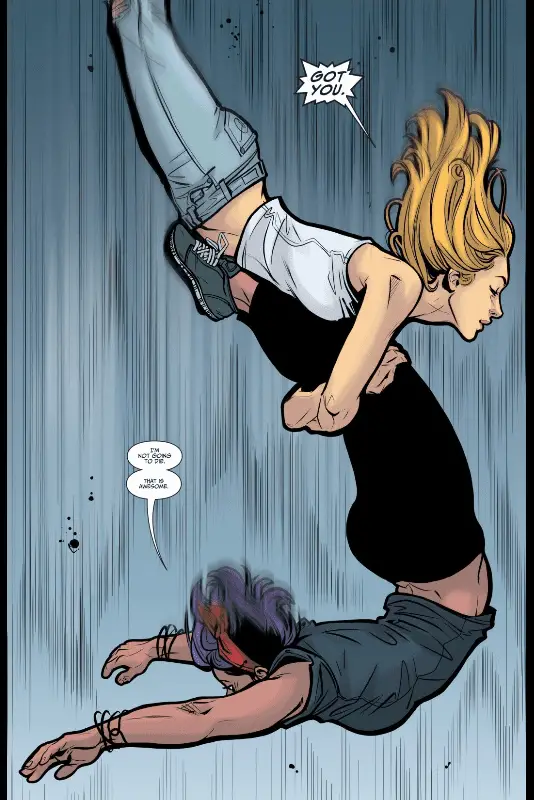
In short, so good, y’all. So. Good.
What I Loved
As the miniseries closes, I must say how much I have loved this story. Taking a step back to look at the whole, all of the pieces don’t feel like they should go together: a giant earthquake, the death of Kara’s best friend, another Kryptonian in a lab, said Kryptonian going all revenge-smashy, Lex Luthor being behind it all. It sounds like too much for four issues. Only it isn’t. Each plot element works, is given space to breathe, and feels appropriately explored. The arc plays on themes present in versions of Clark’s/Kal’s discovery of his powers without being a repetition.
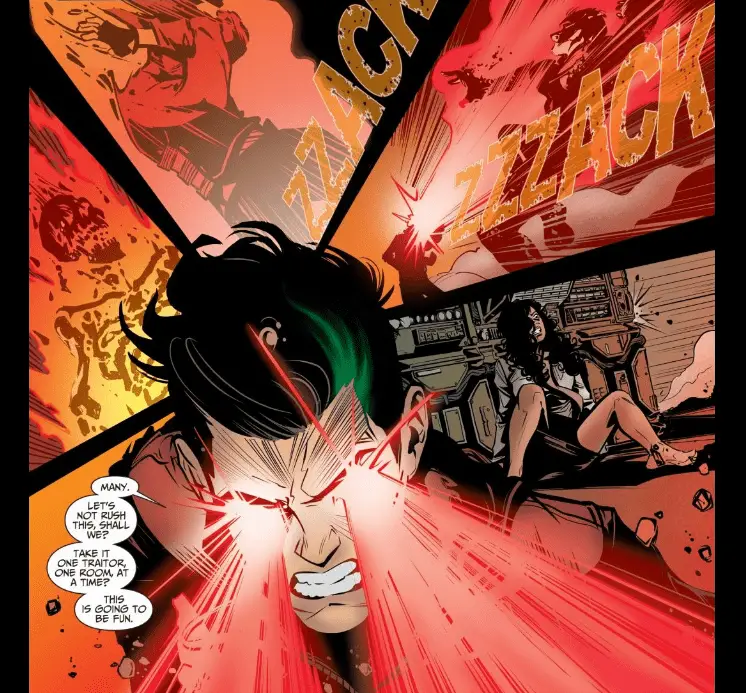
The villains/antagonists have been written well. Tan-On quite vividly reminds me of recent DC film adaptations of dark!Superman. Only this transformation actually makes sense. His jaded perception of humanity stems directly from his experience being tortured and experimented on for decades. He doesn’t want to help human beings or save them, he has seen their worst side and would rather destroy them. It’s perfectly understandable in his situation; readers can sympathize with his reaction even if we also agree with Kara that not every human is as bad as Tan-On believes.
Speaking of villains, Coach Stone is the best kind of villain, in my opinion. She makes sacrifices for the greater good of humanity. She’s chilling but still understandable because at some level she seems to truly believe she’s doing what she does for scientific progress and the betterment of humankind. None of that makes her actions good or even unproblematic. But her good intentions put her in a different category from Lex, the shadow villain behind the whole thing who does seem to have cruel intentions, and is exploiting Stone’s idealistic mindset to further his own agenda.
They’re interesting foils for each other. Both scientists twisted by circumstances into acting in ways counter to their idealism. Tan-On’s torture twist him to seek deathly revenge against those who hurt him so that he can save himself and get home. Stone’s desire to ‘save’ humanity twists her into experimenting on alien life, making ‘sacrifices’ for the good of humanity. It’s a fascinating and compelling dynamic, and I hope to see these two again in a future issue, preferably together.
In other ‘characters I want to see in the main continuity’: Dolly. I adore her dry sense of humor in the face of death. She’s also such a great friend to Kara; their bond in the face of their shared grief over Jenny’s death is poignant and helps ground Kara’s ‘human’ side. I also appreciate that Tamaki gave Dolly a happy ending with a girlfriend. She didn’t have to, and yet she got a bit of happiness anyway. Thank you.
Still, this is Kara Danvers’ story and she shines brightly within Tamaki’s story and Jones’ pen. This series explores how Kara’s grief and loss drives her compassion and heroism. The moment Kara remembers her family and the loss of Krypton, we feel it as deeply as she does. Her family and home are gone. That realization then drives her to protect Earth, the family, friends, and home she has left. It’s a different experience of Krypton from her cousin’s and it makes perfect sense. Her loss is more visceral for remembering her family, and that drives her desire to be a hero. The miniseries handles this distinction well and truly brings out how different Kara’s and Kal’s perspectives and feelings would be without placing a value judgment on either.
That Kara is further driven by the loss of her best friend and the fear of failure adds layers to her psychology. That moment where she goes to save Dolly from Tan-On is so authentic and real. We can see how every act of rescue is a bit of redemption for that first perceived failure (even though it wasn’t her fault). Her experience of grief and loss drives her compassion. Her desire to help people stems from not wanting to see other people hurting as she has in a convincing way. In short, her psychology feels both real and true to her character.
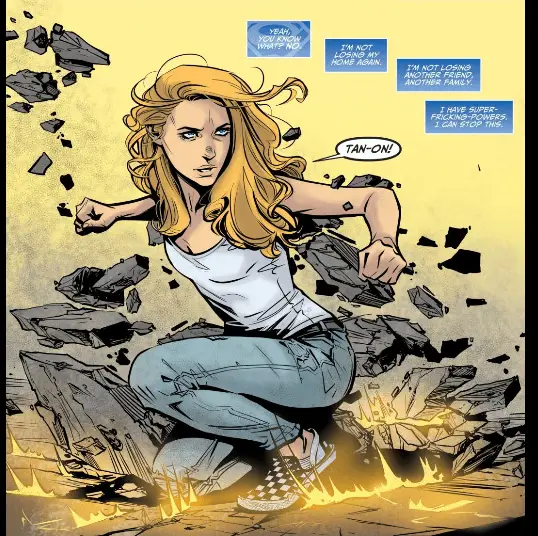
At the same time, Jenny’s death never feels like fridging, primarily because of how honestly the issues explore Kara’s experience of grief rather than focusing first and foremost on how it turns her into a hero. By creating narrative space in issue two to fully dive into the grieving process, Supergirl: Being Super bypassed fridging and went straight to emotional depth and weight. It’s heavy, for sure, but honest. And when we finally see Kara turn that loss into a drive for heroism, it’s completely earned.
I still have lingering questions at the end of the issue. Did Kara finish high school? Does she go to college? Is she ever able to see her family again? What happens to Dolly? But this isn’t a bad thing, at all. It only means there’s room to explore more of her backstory if the main continuity chooses to. The issue created a compelling beginning to Kara’s story without tying up all the loose ends, which only leaves me hungry for more from the dynamic duo of Tamaki and Jones. More please!
Some Nitpicks
Nope, still don’t have any.
Is it Worth Reading?
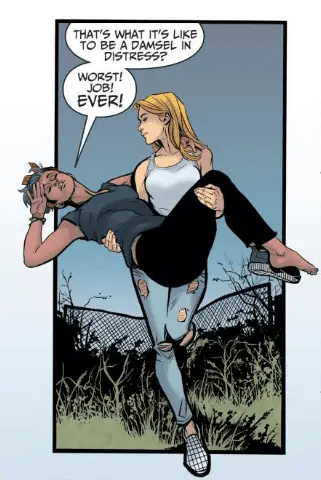
Issue Score: 10/10
Miniseries Score: 9.75/10, only because zitsplosions are a personal gross out for me.
The TL;DR
Wholeheartedly Approve
- EVERYTHING. No really.
- Well done villains and antagonists
- Final evolution into Supergirl feels earned
- Seeing Kara’s grief bringing out her compassion and heroism
- Everything about Dolly: her snark, her courage, her new lavender haired girlfriend
Eh, I Could Do Without It
- This issue? Absolutely nothing.
Images Courtesy of DC Comics
Supergirl: Being Super 2 Credits
Writer: Mariko Tamaki
Artist: Joëlle Jones
Colorist: Kelly Fitzpatrick
Letterer: Saida Temofonte
Cover: Jones & Fitzpatrick

